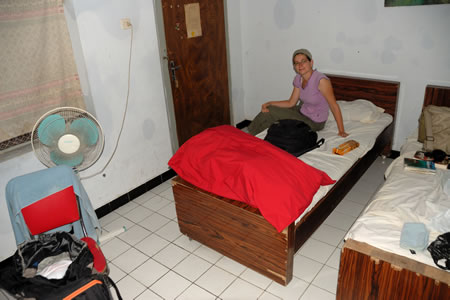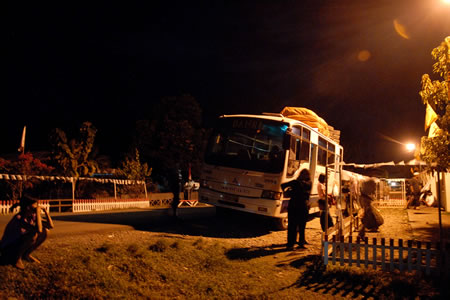

| Caught by paparazzi in Sulawesi | |
Palu (Indonesia), September 15th 2008 |
|
It is 8:30 a.m. when we are sitting on our hotel bed with a pack of “speculaas”. Speculaas is a typical Dutch kind of spiced biscuits which is hardly ever available abroad. In Indonesia it is a real luxury product that can only be bought in a few shops. In a supermarket in Gorontalo we ran into it and now we are eating it for breakfast. This breakfast will probably have to keep us going for a long time as we are facing a long bus ride during Ramadan. The bus rides that we had so far in North Sulawesi were not influenced by Ramadan, which means many breaks to eat or to buy cigarettes. Today, we are travelling from the mainly Christian Northern part of Sulawesi to the more Islamic central area of this island, so we don’t know how Ramadan will influence this trip from Gorontalo to Palu. Therefore, we prepare ourselves that our breakfast of speculaas and water will be the only thing that will enter our stomachs until the sun sets. Today, we travel with the Damri bus company. This company is from the government and has, like the private companies, two main tasks. The busses have to transport people and their luggage from one place to the other, but they also serve as parcel delivery service. When we are waiting at the Damri bus station, people come and go to bring parcels that have to be delivered on the route from Gorontalo to Palu. Parcels can be of all sizes. The roof of the bus is fully packed with a “parcel” of truck tires with less than a millimetre of tread on them and even a heavily damaged fender of a minivan is loaded on top of the bus. While in Europe these goods would lie crumpling on a scrap heap, here there are people who are willing to pay money to transport them. In this part of the world, everything is used until it finely falls apart in a way that it can’t be fixed. With the roof fully loaded, the remaining bags of rice, water pumps and boxes with a fishy smell are put in the aisle. When we climb over these parcels to our chairs, we realise that the aisle will not be useful to stretch our legs once in a while. The bus leaves the station at 10:30 a.m. with only half an hour delay. This doesn’t mean that the bus is already on the way to Palu. Within a radius of 20 kilometres from Gorontalo are passengers picked up who didn’t want to come to the bus station. This could be called service, but it takes a lot of time and this causes that we already have a sore bottom before we really leave Gorontalo. |
|
 |
|
Waiting for the bus in our 'inspiring' hotel room in Gorontalo |
|
After a few hours driving, the bus is put at the side of the road. The driver jumps out of the bus and knocks with a stone at the right rear tire of the bus. The tire appears to be broken. Because it gets bloody hot inside the bus when it isn’t driving, all passengers get out. We find a place in the shade of a tree. Soon, we come to notice that we are spied upon by five pair of eyes. Slowly but steadily, five schoolgirls from around eight years old are getting closer with a hand phone. They are clearly on a mission and that mission is to put us as real paparazzos on a picture. They first try it from a greater distance, but then they get closer. The small girl with the short hair is the bravest and leaves the others behind. She positions herself a metre in front of us and makes a picture of the first foreigners that she has ever seen in her village. We reward her courage with a big smile. Another reason for smiling is that the tire is repaired by one of the many repair shops that every Indonesian village has, so we can continue our trip. An hour later, it is the left rear tire that breaks. Here, there is no shady place and soon we are soaking wet because of our own sweat. This valuable liquid can’t be replaced within the next couple of hours. We noticed that nobody is eating or drinking in the bus because of Ramadan. Therefore, it is not-done to pester the other hungry and thirsty by eating or drinking in front of their eyes. Luckily, the flat tire is fixed after an hour. With all windows open, the temperature in the driving bus is fine. After this eat, drink and smoke break the bus continues its journey. We are already eight hours on the way and we don’t know how long this ride will take. All that seems certain is that it will take longer than the planned 18 hours. At 20:00 p.m. we stop at a small restaurant where they serve rice, fish, green beans and noodle soup. We also join in and it taste well. An hour after the bus is back on the road again awaits another delay. There is a police checkpoint. A few years ago, there were severe unrests in central Sulawesi. The Islamites and the Christians have literally butchered each other and, while the full truth of this sad history will never be revealed, it is known that the police and military have stirred up the fire. The armed forces also didn’t offer adequate protection for the civilians against the militant groups. Every book or article about that period is shocking and terrifying at the same moment. After these unrests, the number of police checkpoints is increased, but nobody knows whether this helps the situation. Everybody has to show their identity cards and some people have to explain why they are making this long journey to Palu. By offering the police man a folded note of 10.000 Rupee, the questions stop. When the police men notice us, we are asked to get out of the bus. They want to see our passports and it seems the first time that these men see a European passport. There are gathering a growing number of people around us: police men, military people and one man with a black bandana that looks like the ruthless militia leader in a movie. Only a few men don’t wear any uniform, but all men have in common that they are younger than 25 years old and carrying weapons. Whether they carry a small hand gun or a semi-automatic weapon, they all make sure that everybody sees that they are armed. The men that are inspecting our passports come to the conclusion that our visa is expired. “No” is our answer, “that is because you are looking at our visa of Pakistan”. Indeed, the visas of Pakistan are expired but as we aren’t there anymore that isn’t relevant. Patiently, we show our Indonesian visa that is valid for 60 days starting at 9 Augustus. So we aren’t even close to the expiry date. After five telephone calls, they get the point and are we allowed to go back into the bus. In the meantime, the bus was searched for explosives although you clearly don’t have to be an expert to get one on the bus. Just pack a bomb as a parcel and nobody will notice it. |
|
 |
|
Dinner stop somewhere between Gorontalo and Palu |
|
The remainder of the bus ride goes on like the previous hours. The local passengers sleep in the most remarkable positions and we also try to get some sleep. We never sleep well in a bus, but now this is even more difficult because of the bus’s function as parcel delivery service. Even in the middle of the night, we stop to deliver parcels. Whenever the bus stops, all lights go on, leaving us with our eyes wide open. When the sun is above the horizon again, a new fasting day starts for the Muslims in the bus. The cigarettes are put out and after another two-and-a-half hour we arrive in Palu. Twenty-two hours after we left Gorontalo, we finally are there. While this trip was just as uncomfortable as we expected, we will remind it in a positive way. Two flat tires, being followed by paparazzo schoolgirls, “celebrating” the sunset during Ramadan, an unusual police checkpoint and the opportunity to observe the postal system in rural Sulawesi make this trip worthwhile. Like a fellow passenger said to us during the trip: “Travelling by public bus in Central Sulawesi might not be the most comfortable way of travelling, but by doing so you experience how we (the normal people of Sulawesi) travel”. That nails it for us. © copyright - Babakoto.eu / 2008 |
|